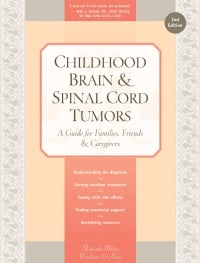Childhood Brain and Spinal Cord Tumors
Chapter 18: School
Most of us had two feelings at the same time: wanting to go back to school and being scared of going back.
— Eleven children with cancer There Is a Rainbow Behind Every Dark Cloud
CHILDREN WITH BRAIN AND SPINAL CORD TUMORS often experience disruptions in their education because of repeated hospitalizations or side effects from the disease or treatment. As their health improves, and when their treatment schedule allows, returning to school can be either a relief or a challenge.
For many children, school is a refuge from the world of hospitals and procedures—a place for fun, friendship, and learning. School is the defining structure of children’s daily lives and going back to school can signal hope for the future and a return to normalcy. Some children, however, especially teens, may dread returning to school because of temporary or permanent changes to their appearance or concerns that prolonged absences may have changed their social standing with friends.
In addition, physical disabilities caused by the tumors or cancer treatment may prevent children from participating in games, gym class, athletics, or other activities. These physical impairments sometimes require time out from the regular classroom for physical, occupational, and speech therapies. School can also become a major source of frustration for children who learn differently as a result of the tumor and/or treatment. Many children who survive brain or spinal cord tumors require specialized education and rehabilitation services.
Although educating children who have or had brain or spinal cord tumors can be a complex process, many issues can be successfully managed through careful planning and good communication. This chapter covers educational issues your child may encounter during and after treatment, a short section about avoiding communicable illnesses at school, and stories full of advice and experiences from many families of children with brain or spinal cord tumors.
Table of Contents
All Guides- Introduction
- 1. Diagnosis
- 2. The Brain and Spinal Cord
- 3. Types of Tumors
- 4. Telling Your Child and Others
- 5. Choosing a Treatment
- 6. Coping with Procedures
- 7. Forming a Partnership with the Treatment Team
- 8. Hospitalization
- 9. Venous Catheters
- 10. Surgery
- 11. Chemotherapy
- 12. Common Side Effects of Chemotherapy
- 13. Radiation Therapy
- 14. Peripheral Blood Stem Cell Transplantation
- 15. Siblings
- 16. Family and Friends
- 17. Communication and Behavior
- 18. School
- 19. Sources of Support
- 20. Nutrition
- 21. Medical and Financial Record-keeping
- 22. End of Treatment and Beyond
- 23. Recurrence
- 24. Death and Bereavement
- 25. Looking Forward
- Appendix A. Blood Tests and What They Mean
- Appendix C. Books and Websites

